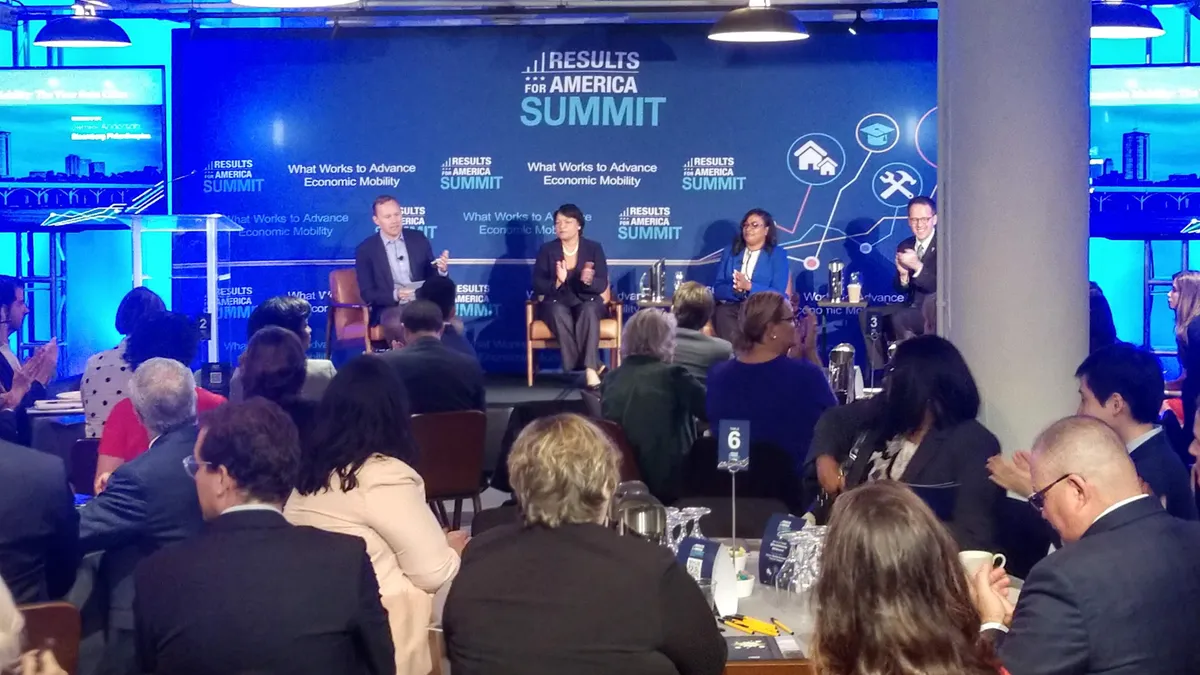Dive Brief:
- Cities can revitalize their economies, improve job training and help bring more people out of poverty if they use data and evidence to meet people "where they are," according to the mayors at a panel Thursday hosted by Results for America.
- A data-driven focus has helped New Orleans identify where skills gaps exist among young people, especially as they prepare for the jobs of the future, said New Orleans Mayor LaToya Cantrell. In turn, the city becomes an attractive place for businesses to locate. "What we see is that if we do not focus on growing that capacity and closing that gap, then we will not be preparing the residents of New Orleans, the young people of the city, to take advantage of those opportunities and therefore the company having to look outside of the city," she said.
- Meanwhile, Rochester, NY Mayor Lovely Warren said the city has worked to identify the communities left behind by rapid change and help them take advantage of new opportunities. That work has included establishing the Office of Community Wealth Building, which Warren said helps people "make their money work for them" and encourages greater financial literacy.
Dive Insight:
Attracting new generation jobs and business is one of the most important parts of a mayor's job, although it caused some controversy last year as several hundred cities wrestled with each other for the chance to host Amazon’s second headquarters (HQ2). In the aftermath, some city leaders warned against the feverish chase for big companies, and instead said cities should focus on local employers close to home.
The Results for America's Summit panel in Washington, DC focused in part on how cities should use data and evidence to do things differently. Warren said those efforts can be as simple as introducing an electronic tracking system for snowplows, which would give residents information about when their streets will be plowed and help residents know when to clear their cars of snow.
“Part of meeting people where they are is understanding that there may be a better way,” Warren said.
But the city must properly explain to residents how new innovative tools and methods are used in order to avoid mistrust and confusion. "We have to create the stairway, they have to want to walk it," she said.
Trust can be built by ensuring that policies are tailored to specific issues and communities. Those initiatives are not just one-size-fits-all. Instead, tailoring specific efforts at a granular level is more effective, said Tulsa, OK Mayor G.T. Bynum.
"If you're working on a small scale, whether that’s from an economic standpoint or in our case a community development, the solutions become much more clear," Bynum said.
Tulsa has been heralded as an effective user of data, particularly through efforts like the 2018 Gallup-Tulsa Citivoice Index, which surveys city residents and measures how optimistic they are about the future, among other questions.
Bynum said that as city leaders look to avoid the political wrangling that often consumes Congress and the federal government, using data to assess the effectiveness of initiatives and programs is the best way to move forward. It helps mayors do their jobs more effectively, he said.
"For us, data is a tool that allows you to take things out of the realm of philosophical debate and partisan division and instead just boil it down to practical problem-solving," Bynum said.











